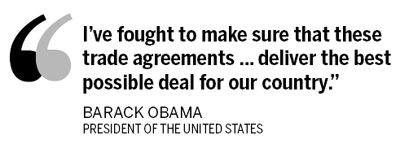US Congress passes biggest FTA since 1994

WASHINGTON - The US Congress approved free-trade agreements with South Korea, Colombia and Panama, bringing an end to years of stalemate and offering what supporters said was the biggest opportunity for exporters in decades.
The bills go to President Barack Obama, who spent two years seeking to broaden support for pacts revised from initial agreements reached by his predecessor. The South Korea deal, the biggest for the United States since the North American Free Trade Agreement in 1994, removes duties on almost two-thirds of American farm exports, and phases out tariffs on more than 95 percent of industrial and consumer exports within five years.
Wednesday's step may diminish concern that the US will turn to protectionism amid an unemployment rate that exceeds 9 percent, coming a day after a Senate vote targeting China's yuan. The approval may also give impetus to Obama's trans-Pacific trade initiative, which Japan, the world's third-largest economy, is considering joining.
"This is a welcome development showing policy makers can be farsighted and come to an agreement that is positive for all parties involved in the long run in terms of GDP growth," said Robert Subbaraman, Hong Kong-based chief economist for Asia excluding Japan at Nomura Holdings Inc. "There's been a lot of market disappointment in policymaking this year."
Economic boost
The South Korean deal would boost American exports by as much as $10.9 billion in the first year in which it's in full effect, according to the US International Trade Commission. The accord with Colombia would increase exports as much as $1.1 billion a year. The US Chamber of Commerce said the accords will prevent the loss of 380,000 jobs.
Companies such as Ace Ltd, Citigroup Inc and Pfizer Inc have led the effort to get the South Korean deal passed, while Caterpillar Inc, General Electric Co and Whirlpool Corp were among the biggest backers of the accord with Colombia.
Obama submitted the legislation after House Speaker John Boehner said he would consider the worker assistance along with the trade deals. First reached under former president George W. Bush more than four years ago, the measures overcame a stalemate with Republicans on aid for workers who lose their jobs to foreign competition.
Obama's welcome
"I've fought to make sure that these trade agreements" with the three nations "deliver the best possible deal for our country", Obama said in an e-mailed statement. "American automakers, farmers, ranchers and manufacturers, including many small businesses, will be able to compete and win in new markets."
The vote is a win for Obama in a week when the Senate declined to proceed with his $447 billion plan to increase employment. A government report last week showed the nation's jobless rate held at 9.1 percent in September.
With advanced economies facing predictions of a return to recession, the free-trade deals show how developed economies are turning to emerging markets as sources of growth. Colombia's gross domestic product rose 5.2 percent in the year through June, and that of South Korea, Asia's fourth-biggest economy, increased 3.4 percent. US GDP expanded 1.3 percent in the second quarter from the previous three months at an annual rate.
'Sorely' needed
"These agreements will provide an economic boost at a time when our country sorely needs it," Montana Senator Max Baucus, who leads the Finance Committee, which controls trade bills in the chamber, said after almost eight hours of debate.
Obama is seeking to double American exports by 2015, in part through boosting shipments to Asian nations. Nine nations are involved in negotiating the US-led Trans-Pacific Partnership trade accord, known as the TPP.
The administration negotiated terms for auto tariffs in the South Korean agreement that won over the United Auto Workers union, an exchange of tax information with Panama and labor-rights assurances from Colombia.
The US Congress passed the agreements as South Korean President Lee Myung Bak visited Washington. Lee told the US Chamber of Commerce on Wednesday that the trade accord will create "good, decent jobs" that will help spur both economies.
Japan's concern
"Japanese companies will be put in a further disadvantageous position compared with South Korean competitors in the US," Yoichi Kaneko, a Japanese lawmaker, said on Thursday in a telephone interview. "There is still an opposition ... but I think it's important for Japan to join the TPP and free trade agreements."
The South Korean tariff phase-outs increase market access for US chemical, automobile, medical device and drug companies, and the end of duties on a range of agricultural exports benefits producers of meat, dairy, vegetables and fruits and nuts. Banks and communications companies would also gain opportunities through reductions in regulatory barriers.
"Removal of tariffs will of course be good. South Korean automobile-parts makers have started to attract heightened interest from customers in the US since the earthquake that crippled Japan in March," said Moon Seung Ki, a spokesman for Hyundai Mobis Co, South Korea's biggest auto-parts maker.
Samsung Electronics Co, the world's No 2 semiconductor maker, said it would see little change in sales from the deal. Nam Ki Yung, a Seoul-based spokesman for the company, said "it will be good for overall trade for both nations. Still, we don't expect a big impact on our business".
Bloomberg News


















